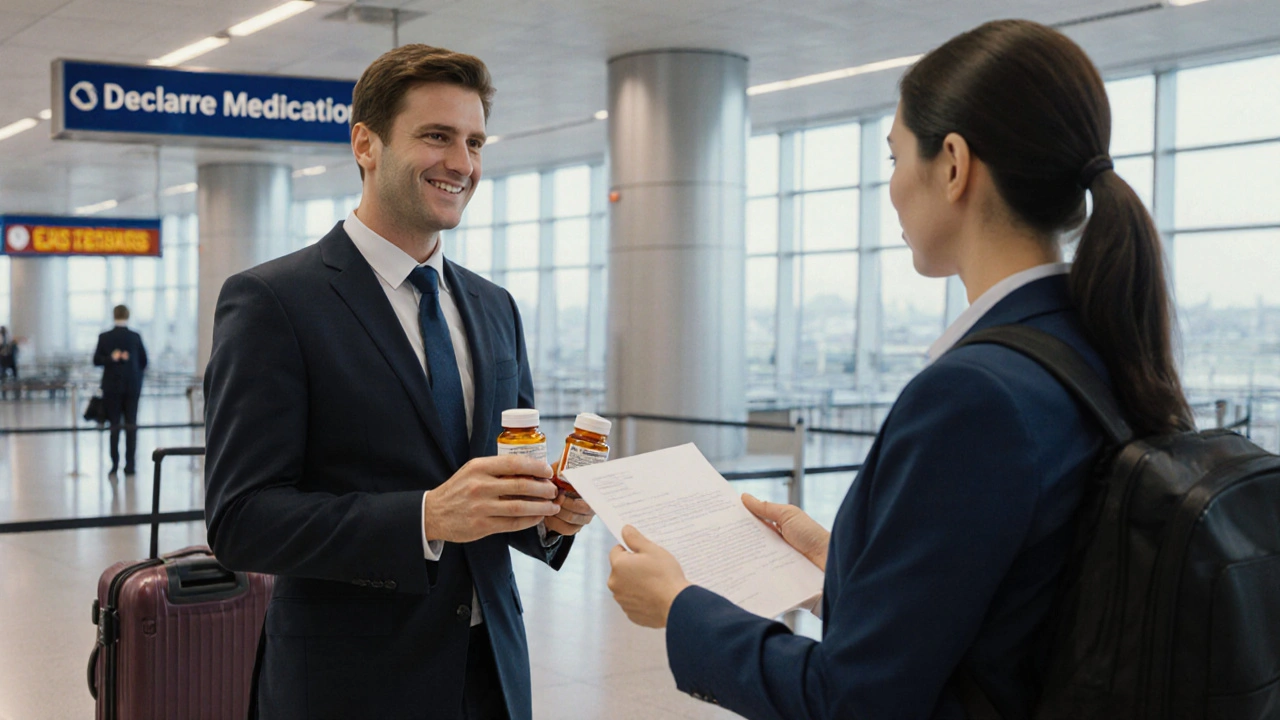International Flight Medication: What You Need to Know Before You Fly
When you’re flying overseas with international flight medication, prescription or over-the-counter drugs carried across borders for personal use. Also known as travel medication, it’s not just about bringing pills—it’s about following rules that vary by country, airline, and airport. Many travelers assume if it’s legal at home, it’s fine on a plane. That’s not true. The international flight medication you pack could get confiscated, delay your trip, or even land you in legal trouble abroad.
Most countries require you to carry prescription drugs, medications legally prescribed by a licensed doctor and labeled with your name in their original containers. That means no pill organizers, no loose capsules, and no unlabeled bottles—even if you’ve been taking the same pill for years. The TSA medication rules, guidelines used by U.S. Transportation Security Administration for carrying drugs through airport security allow reasonable quantities for the trip, but they don’t override foreign laws. Countries like Japan, the UAE, and Australia have strict controls on common medications like ADHD drugs, painkillers, and even some cold remedies. What’s OTC in Florida might be illegal in Tokyo.
You also need to think about airport security medication, how medications are screened during TSA or international security checks. Liquid medications over 3.4 oz are allowed, but you must declare them. Keep a copy of your prescription or a doctor’s note—even if it’s not required. It saves time, reduces stress, and helps if a customs officer questions your meds. If you’re flying with insulin, EpiPens, or injectables, bring them in your carry-on and let the agent know before screening. No one wants to be pulled aside because their insulin looked like a suspicious liquid.
Don’t forget about time zones and dosing schedules. If you take medication three times a day, crossing time zones can mess with your routine. Plan ahead: set phone alarms, use a pill tracker app, or ask your doctor for a simplified schedule for travel. And if you’re taking controlled substances like opioids or benzodiazepines, check the destination country’s rules—some require special permits or pre-approval. The last thing you want is to be denied entry because your anxiety meds weren’t on their approved list.
Below, you’ll find real advice from travelers who’ve navigated these rules, from packing tips that saved their trips to the one mistake that cost them hours at customs. Whether you’re flying to Disney World from abroad or heading to a beach in the Caribbean, getting your international flight medication right means less stress and more time enjoying your vacation.
- September 20 2025
- 13 Comments
- Lucas Harrington
How to Travel Internationally with Prescription Medication
Traveling internationally with prescription medication requires planning. Know your meds' legal status, carry original packaging and a doctor’s letter, bring extra supply, and declare everything at customs to avoid fines or detention.
- Disney World Vacations (35)
- Kissimmee Florida (29)
- Florida travel (26)
- Crypto & Blockchain (10)
- Information & Privacy (5)
- Blockchain & Cryptocurrency (4)
- Disney Parks & Tips (3)
- Disney History (3)
- Travel (2)
- Travel Tips (2)
Categories
- January 2026 (6)
- December 2025 (29)
- November 2025 (41)
- October 2025 (16)
- September 2025 (6)
- August 2025 (3)
- July 2025 (3)
- June 2025 (2)
- May 2025 (2)
- April 2025 (1)
- March 2025 (6)
- February 2025 (11)
Archives
- Florida beaches
- Disney World
- Florida
- Florida travel
- Kissimmee demographics
- Kissimmee
- Kissimmee Florida
- Orlando tourism
- Disney park hours
- Disney World tips
- Disney vacations
- Disney 100
- theme park tips
- Disney celebration
- tourism
- Disney secrets
- Disney history
- travel
- Disney World crowd calendar
- Disney World cost

